A few posts ago, when we discussed the TheOne “BM87” balisong, I did not let on that I ordered something else at the same time. There are, well, two of them.

This is the TheOne “BM51,” V6. As you would expect, it is a direct clone of the Benchmade Morpho Model 51. Almost. You see, there are some changes. One of which is immediately visible – I’ll address that in just a moment. The other isn’t.
The Model 51 is Benchmade’s now very discontinued larger version of the Model 32 “Mini Morpho.” I don’t own a Model 51, but I do own a Model 32 and I have vouchsafed to you previously that it is my favorite knife in the whole wide world. The Model 51 is much the same but longer. If that’s what you want, that’s what it is. Although if you fancy a Model 51 now you’re going to have a tough time of it. The used market is your only option, and you’ll be paying continually skyrocketing collector’s prices for the privilege.
But you can have one of these today for around $110. Which, granted, isn’t exactly chump change, but for what you get it gives the real Model 51 (and 32) a run for its money.
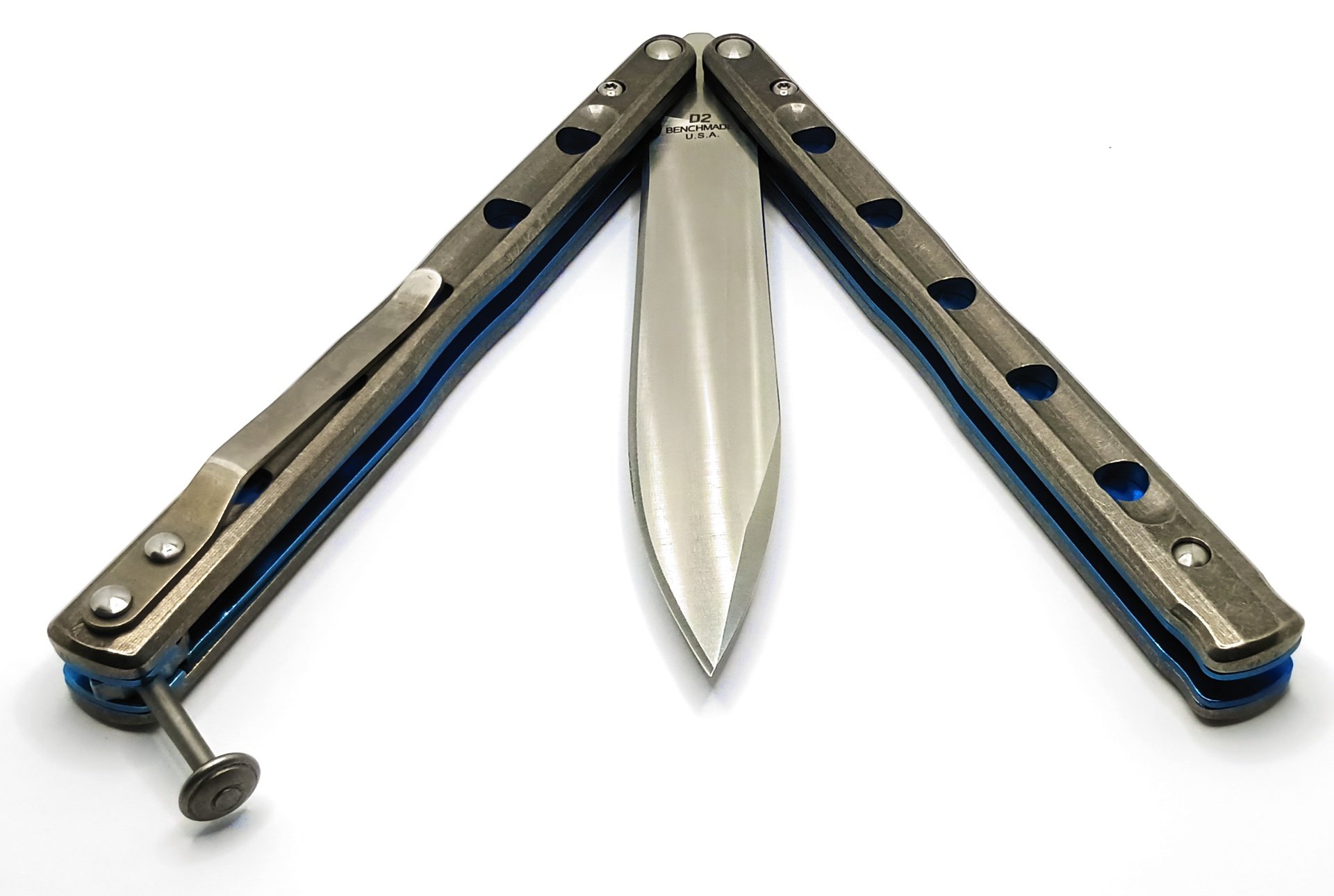
The (the the the) TheOne BM51 is a very high quality piece of kit.
The one thing that’s noticeable from a mile away is the redesigned solid titanium scales, as opposed to the originals’ carbon fiber ones. I think they’re really swank, even if they do make the knife weigh a bit more. One thing people complained about (although not me!) regarding the Model 32 and 51 was the light weight, which in some people’s eyes was a little too lightweight. If that’s you, then rest assured that the BM51 weighs a more solid 128.6 grams or 4.54 ounces. And again, I don’t have the direct Benchmade equivalent to compare to, but contemporary sources put the Model 51 at 3.3 ounces or 93.5 grams. So the difference would indeed be noticeable, I think.
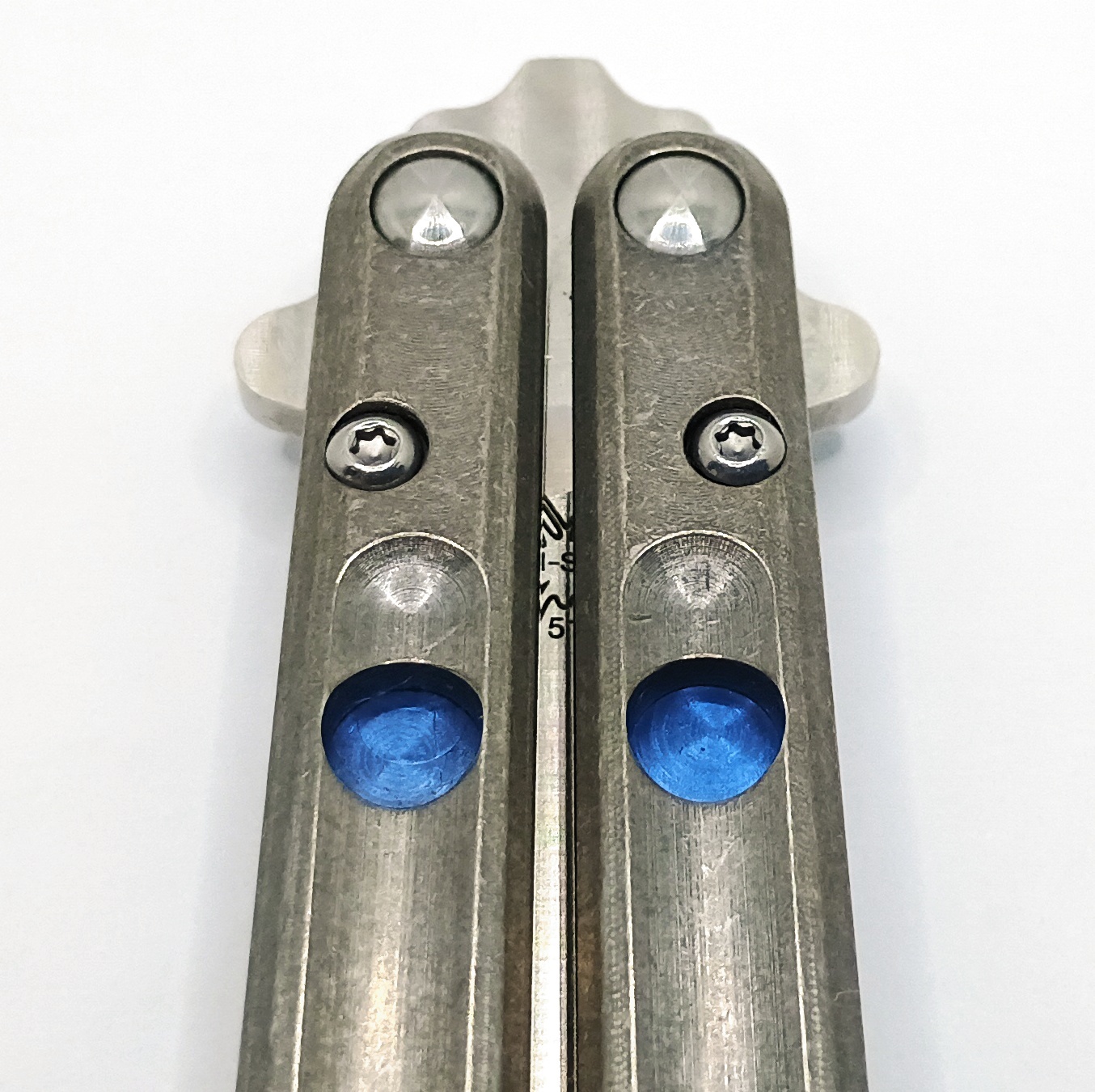
The scales are rebated with channels down their length, and have five round holes each rather than the original’s slotted design. The liners are solid titanium as well, just like the original, and they are anodized in a brilliant blue. And also like the original they are jeweled, although the pattern is coarser and less of it shows through. The effect is really striking, though. Side by side with my Model 32, which has the same finish, the depth of the color is quite comparable.
The pivot screws are T8 on the male side, and the female ones are smooth headed “impossible” screws that carry over from the original. The trick to getting knives like these apart, by the way, is to undo the pivot screws with the handles latched together.

It has the dimensions down to a tee as well. It’s 5-7/16" long closed, and 9-3/16" when latched open, with a 4-1/8" spear pointed blade, as measured from the forward tips of the handles. The blade is precisely 0.100" thick, and the spine is very pleasantly rounded. It’s made of D2, allegedly, with an as-machined satin finish. I can’t verify the actual composition of the steel, but given that even inexpensive knives are coming from China with D2 now, I don’t have any reason to disbelieve it. Normally when you buy a clone knife the first thing to go out the window is whatever fancy blade steel the original may have used, but in this case the Benchmades were also regular old D2. So the only possible potential bugbear is differences in the heat treating, which I have a strong suspicion are negligible to nonexistent. And unlike the BM87 I wrote about previously, the BM51 is genuinely very sharp right out of the box. If you want to start using it for stuff right away it won’t need much if any of a working over.
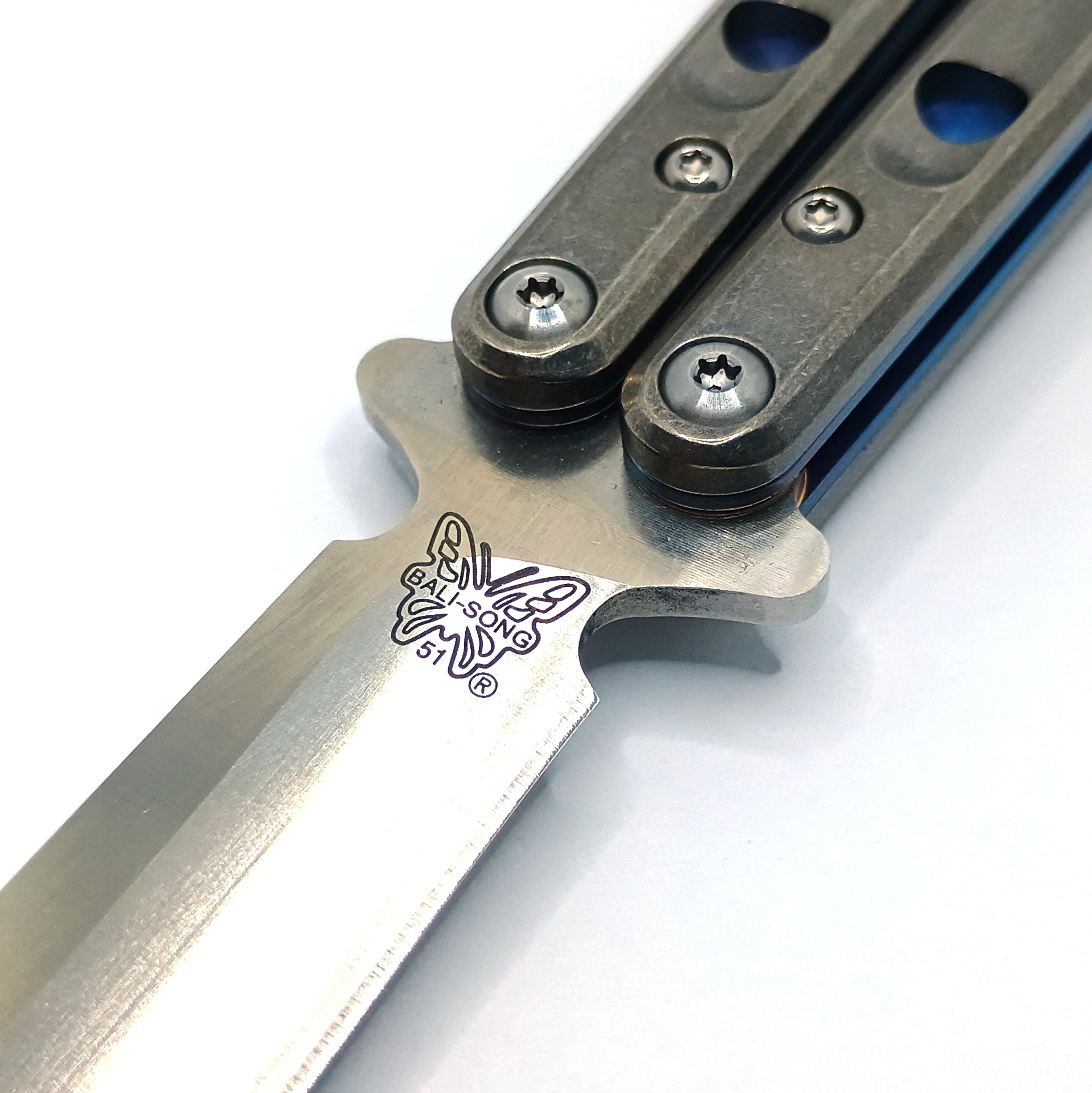
The BM51 has a Zen pin kickerless rebound design, which I like a lot. But the other feature it has is the fake Benchmade logo pictured here, and that’s the one thing about it that really pisses in my corn flakes.
I don’t mind buying a knockoff knife knowing that’s what it is. The BM51 is a fine knife in an objective mechanical sense, and I really think it should be able to stand on its own as such even if the design elements are all borrowed. That’s basically what, say, Ganzo does and it’s worked well for them so far. But if there’s even a chance anyone out there in the world may get their hands on this and possibly believe it’s the real deal, even for a second, that’s a bit more objectionable. I have to dock points for this not going the route of the BM87 from before, which at least had the decency to show up without any stolen trademarks on it.
For what it’s worth, my example arrived in a plain white box without any markings on it. So at least it’s unlikely to fool anybody if it happens to show up on a store shelf somewhere.
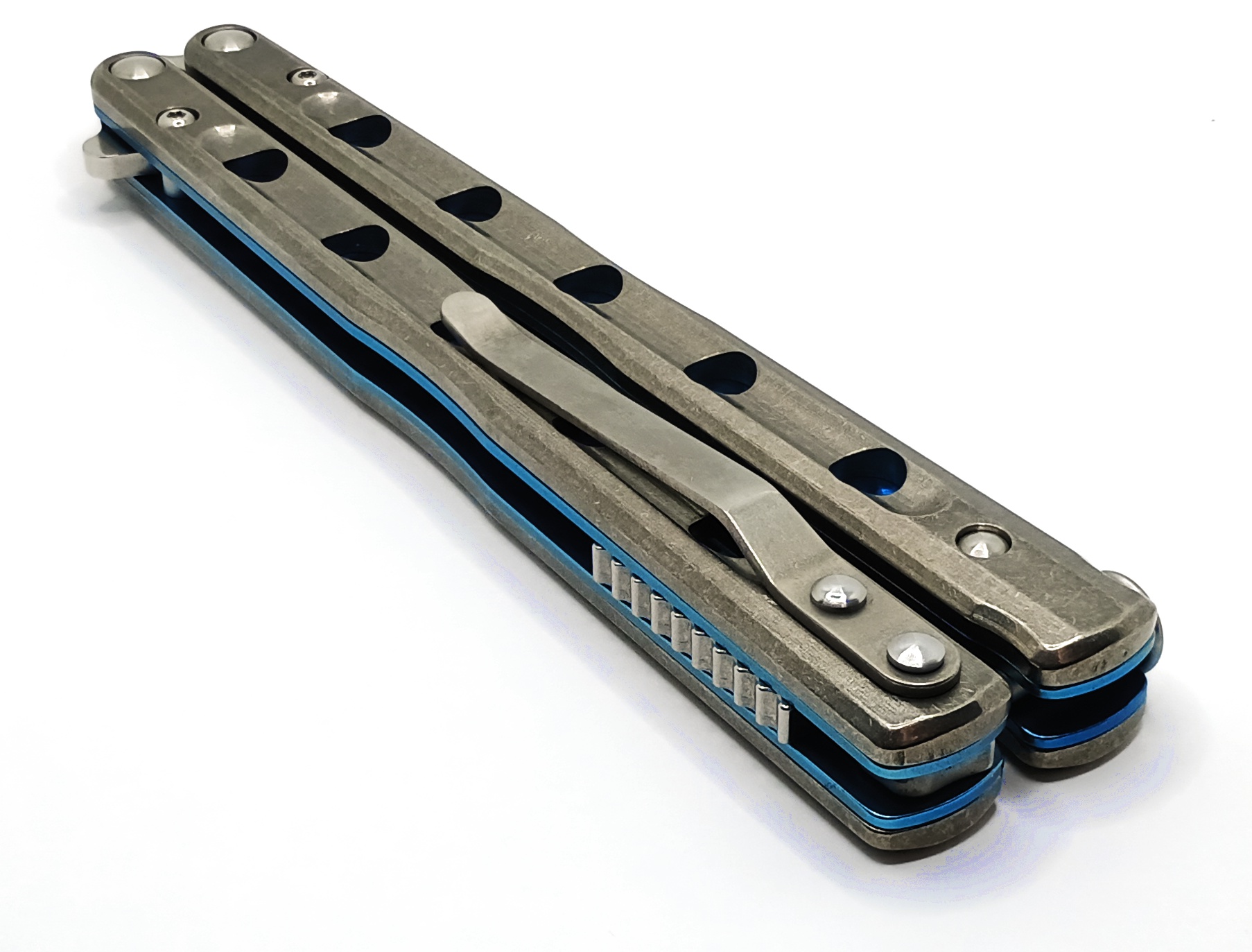
Of course, it does have a pocket clip, and it’s no surprise that it’s exactly the same design as the Model 32 and 51’s. The clip is also titanium – apparently nothing on this knife isn’t except the blade and screws – and is understated without any engraving, anodizing, or any other embellishment of any kind. The ease of draw it provides is supreme, probably owing to the fact that, seemingly unusually for a knife of this caliber these days, it’s actually sprung a little loosely from the factory. You could take it off and give it a bit of a bend if you need a more positive grab. And it is also once again unquestionably on the wrong damn side of the knife by default, which seems to be a pathological fascination shared by every balisong maker in the world. At least it is, with some effort, reversible. More on that later.
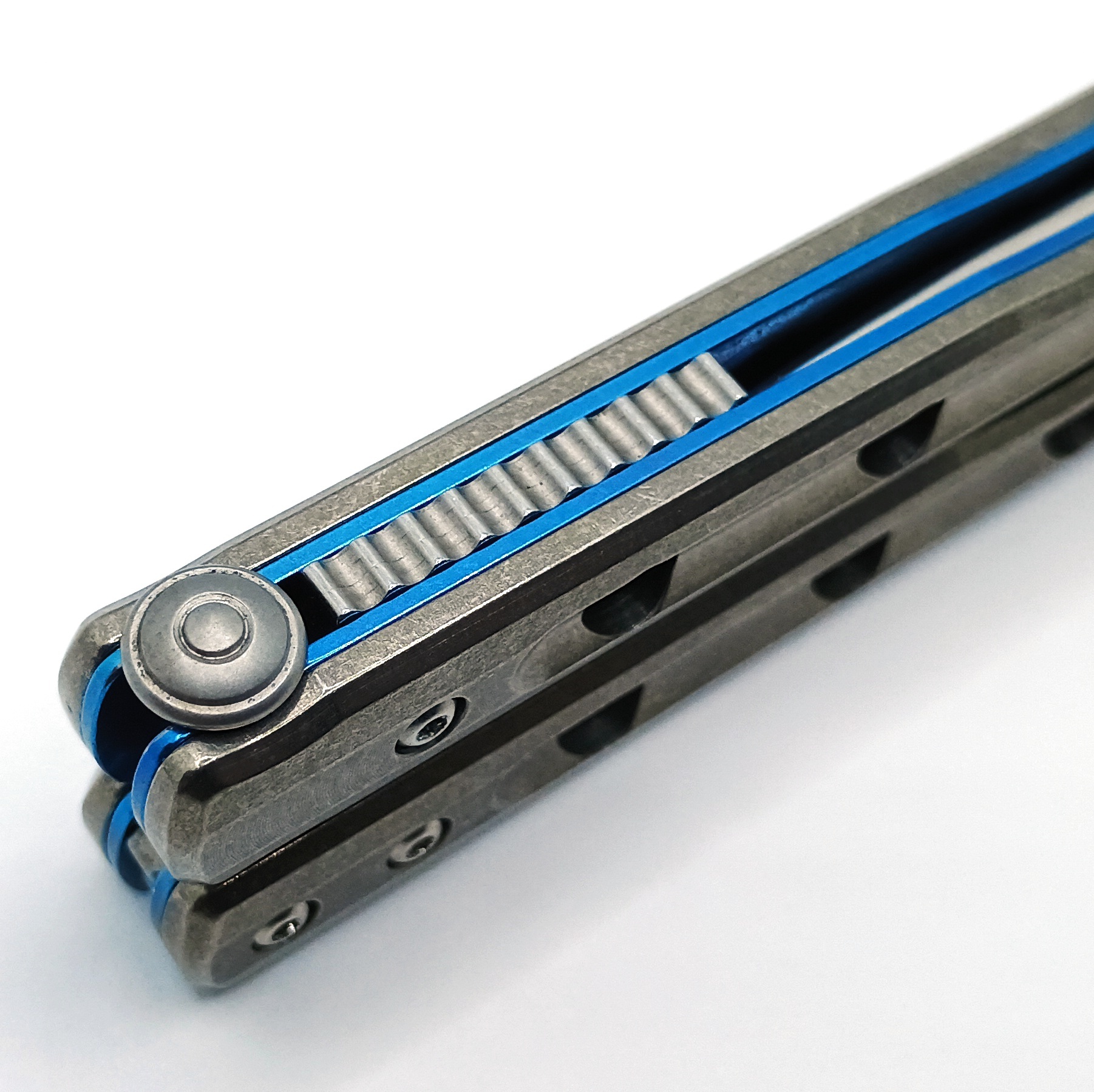
This could just about stand in for a review of the Benchmade 51 while we’re at it, because superficially every single other feature of this knife is the same. It has the same jimped single piece handle spacers, as well as the same kind of button headed latch that is also spring loaded.

(This is in slow-mo, by the way.)
Just give it a squeeze and the latch pops out neatly. It is in my very best Bruce Cambell that I say: Groovy. Zen pins, titanium everywhere, spring latches… All of these are things I like to see in a balisong.
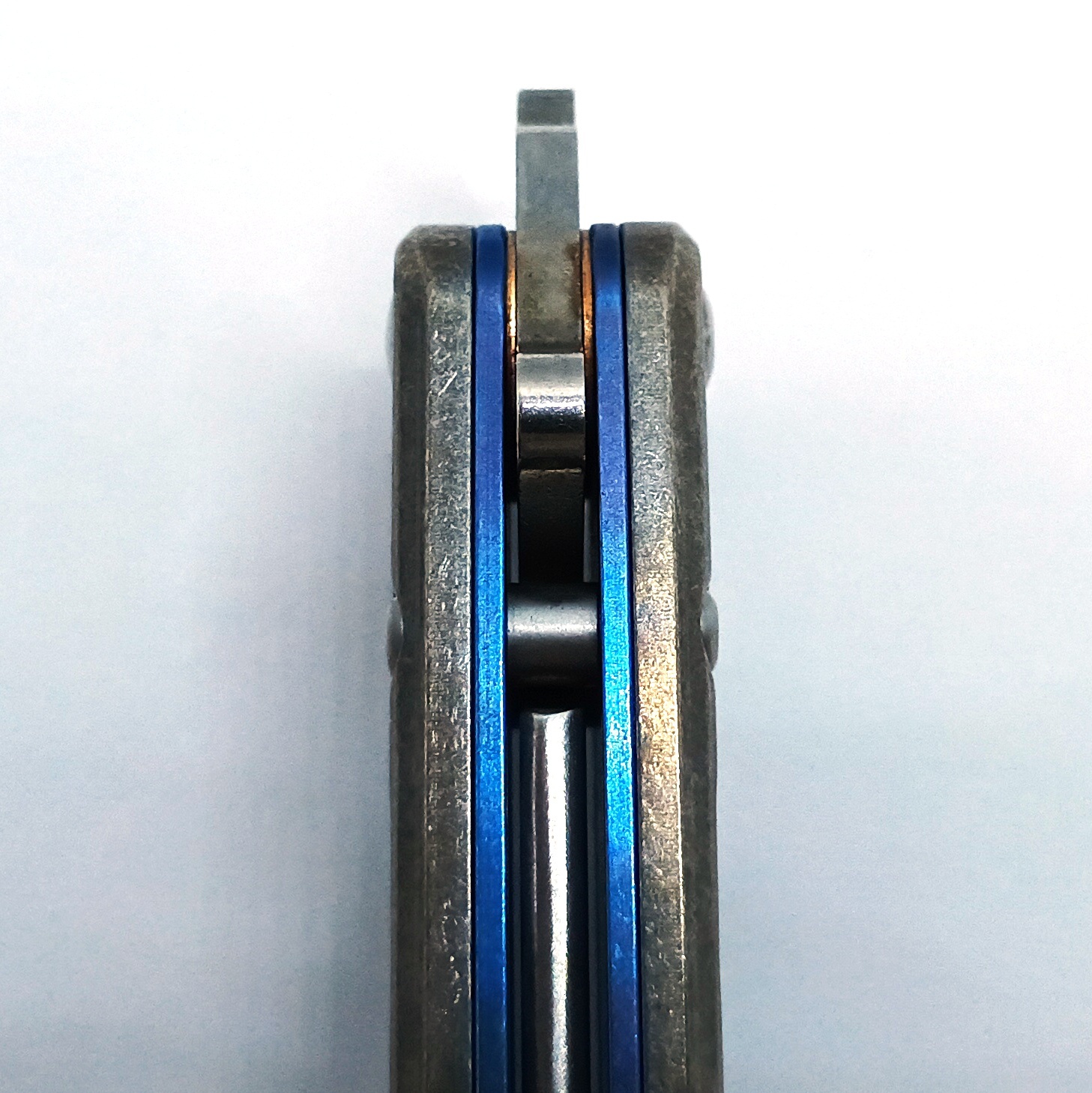
I also like to see nice phosphor bronze pivot washers. I mean, by preference I’d like to see ball bearings, but I’ll take what I can get.
However…
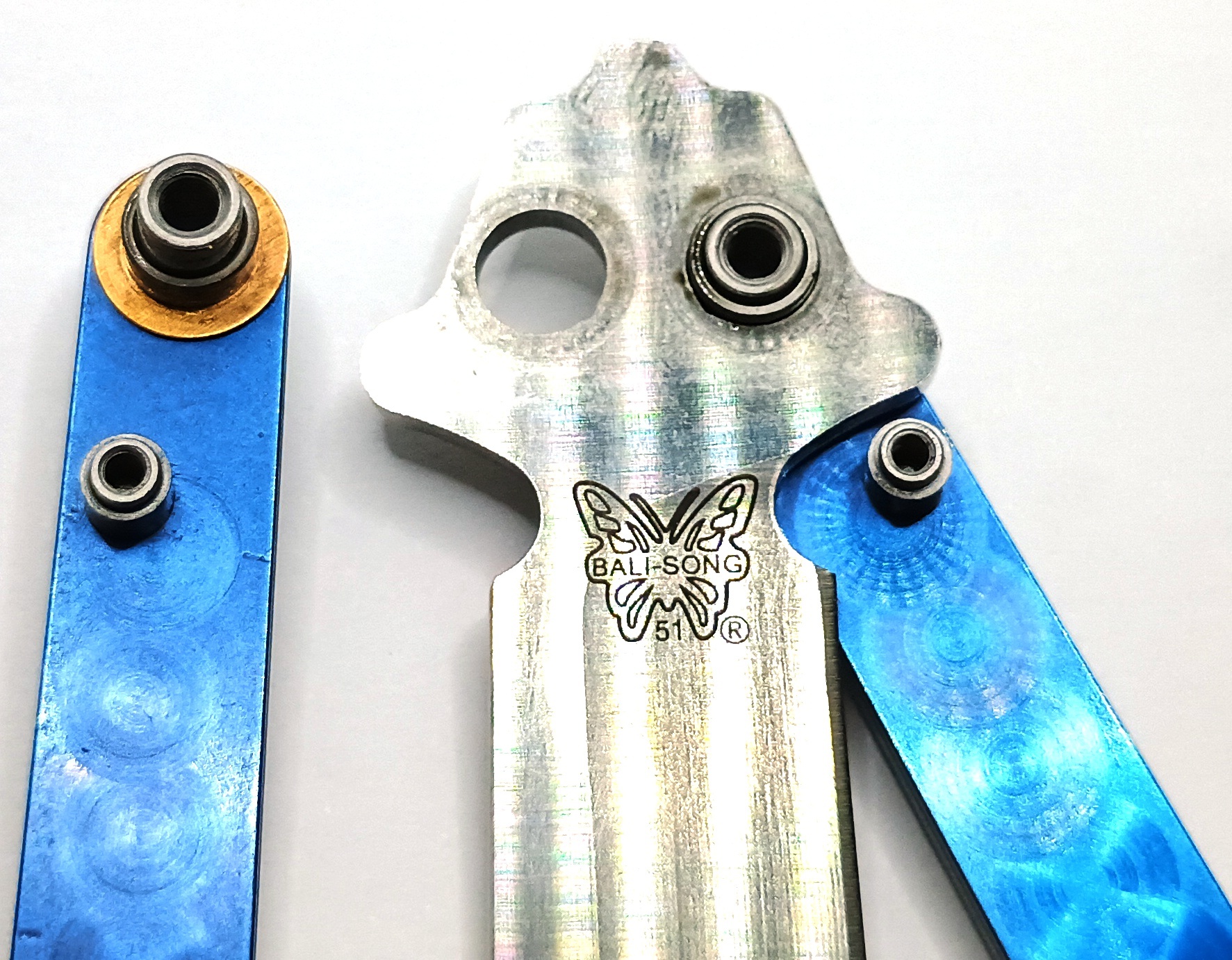
The BM51 has one more surprise up its sleeve, in that it actually has bushing pivots. The original Benchmade actually doesn’t – This is the same design as the one used on the aforementioned TheOne BM87, but in this case it’s a mechanical improvement over the original design rather than a cheapening.
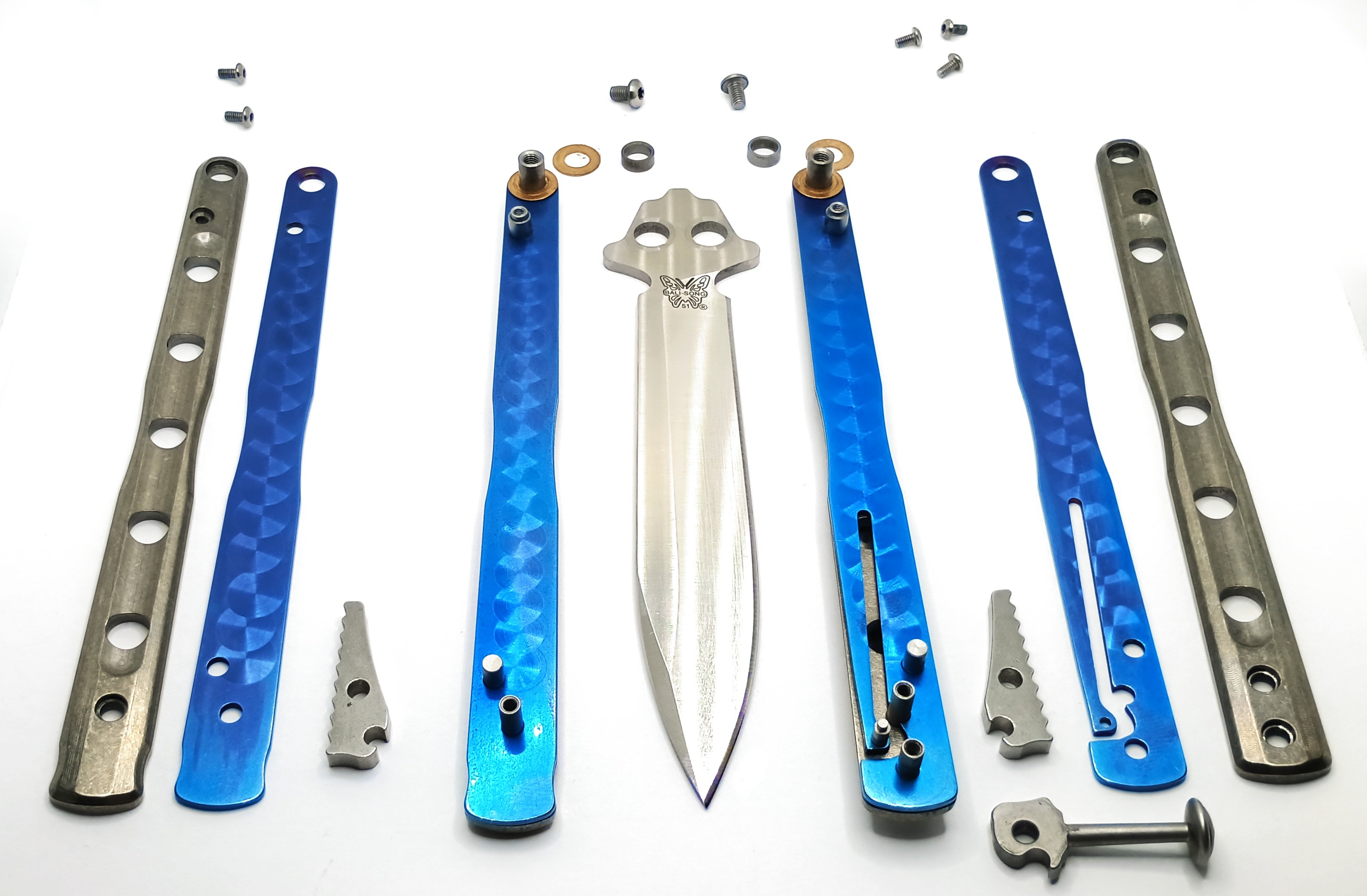
While we’re at it, though, let’s have it in bits. The BM51 breaks down into an identical list of components as its inspiration, with the exception of the added pivot bushings.
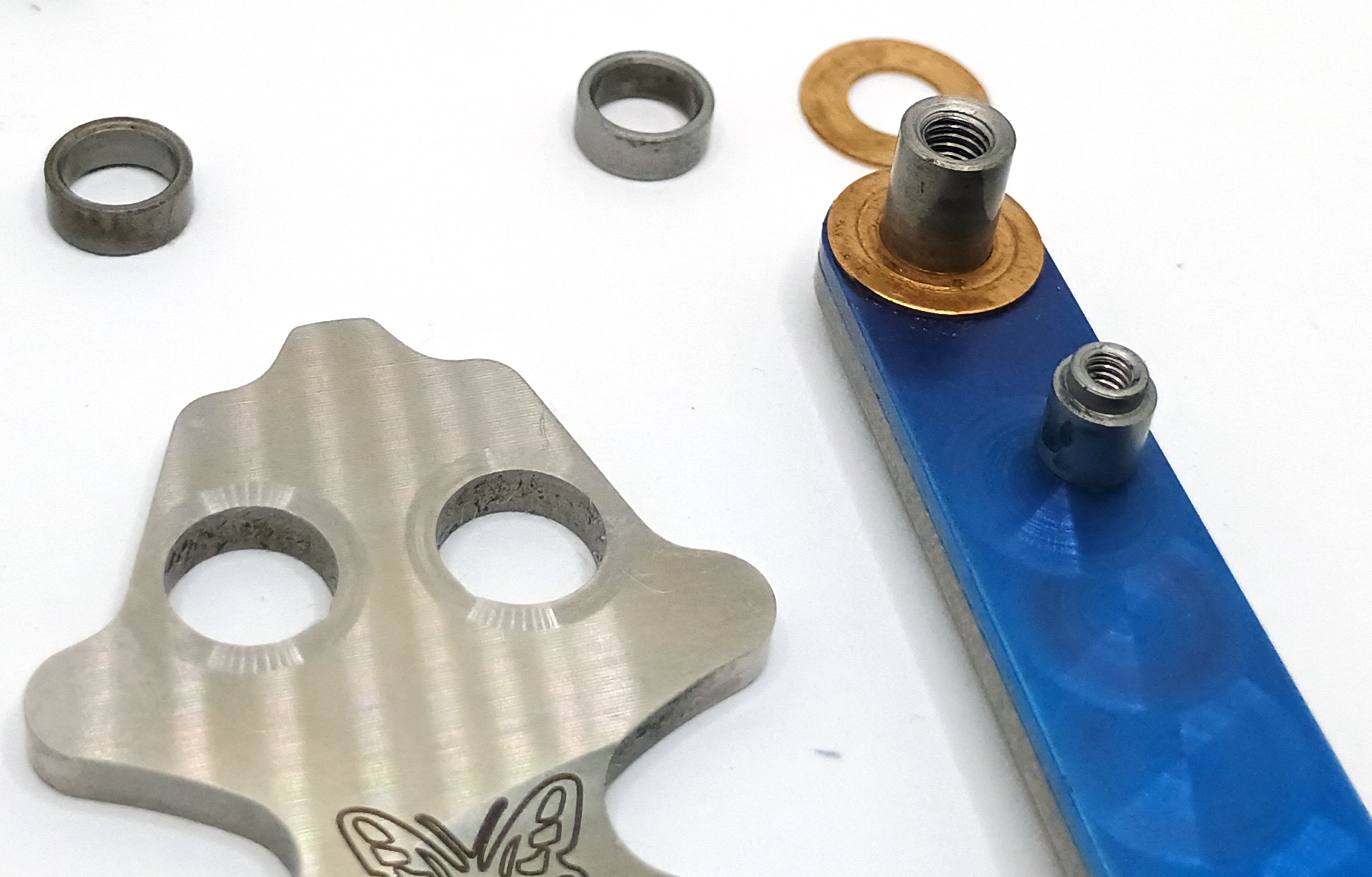
The bushings are extremely precise, and they’re where the BM51’s excellent pivot action comes from. They’re just longer than the blade heel is thick, so free movement is assured regardless of the pivot screw tension.
It must be said that there is always a small but noticeable amount of vertical play in the pivots, though, because there’s always that clearance left over by the bushings that can never, ever be removed no matter how hard you try. Well, short of machining the bushings shorter, I suppose, which would probably be unwise and would also defeat the purpose. If you really want to give it a go, my example did come with a complete extra set of pivot hardware in the box including all four washers, both bushings, and two pairs of pivot screws.
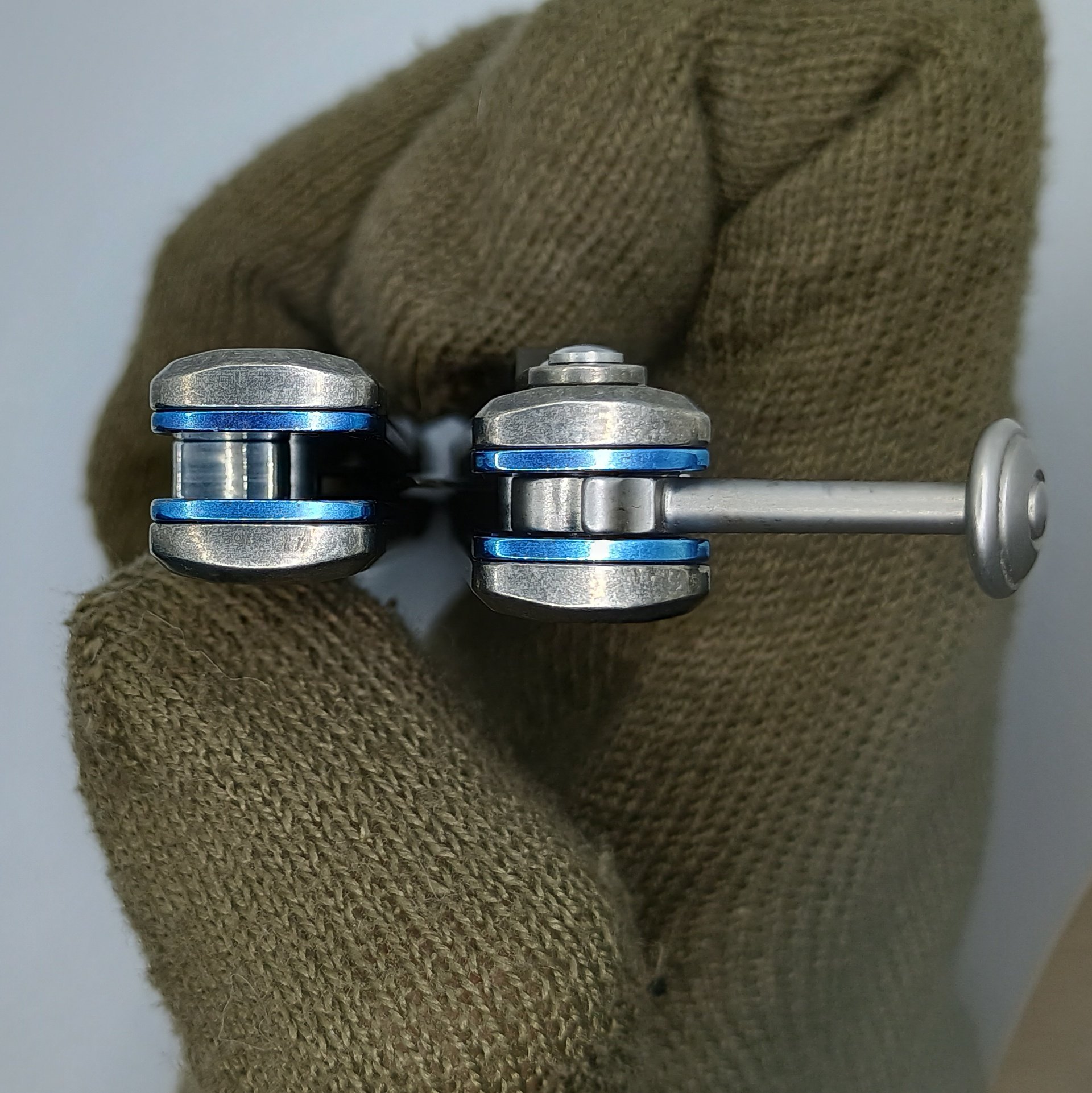
But still, the score the BM51 gets from the old Wiggle Test is actually pretty good, especially taking into consideration that this is not a ball bearing knife and it has long handles, which magnify the visibility of any runout by the time you’re looking at the ends. I think the amount of pivot play is on par with my genuine Model 32. That’s a glowing endorsement if I’ve ever made one.
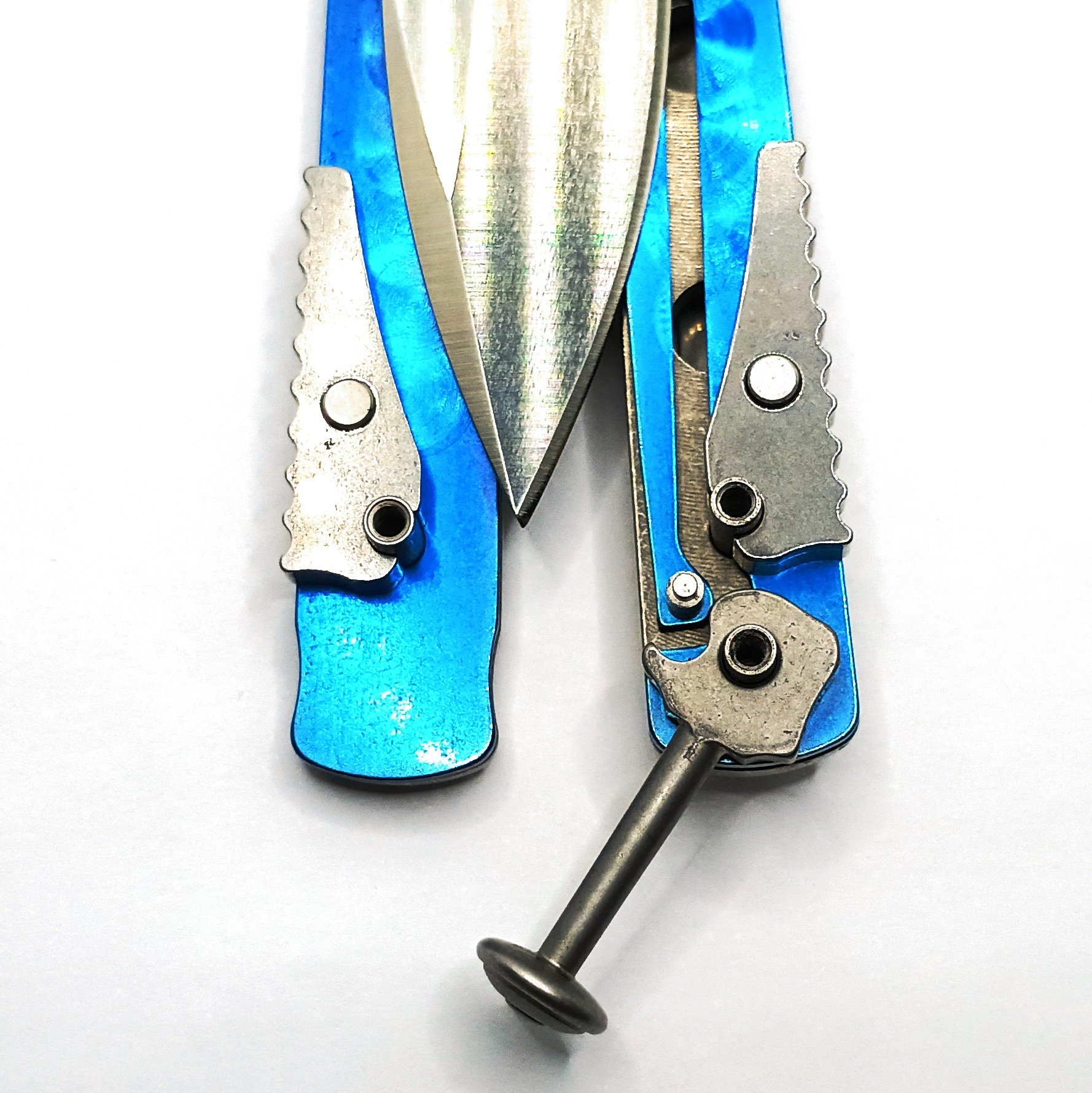
Here you can see the latch spring mechanism faithfully reproduced. The hook on the heel of the latch engages with that tiny pin, there, and the prong on the handle liner flexes out and puts it under tension. The latch also detents in the closed position, and the cam profile on its heel prevents it from being able to swing far enough to hit the blade. This system is really quite clever and obviates the need for a separate spring. The world knows there are enough parts in here already, what with nine screws, four washers, the two bushings, three pins, the threaded Zen pins, four each of scales and liners, the latch… and then the blade.
Oh, and needless to say when I put it all back together I moved the clip over to the right fucking side of the knife. I did that last, so in all of these other photos it’s still wrong. You’ll just have to put up with that, I suppose.
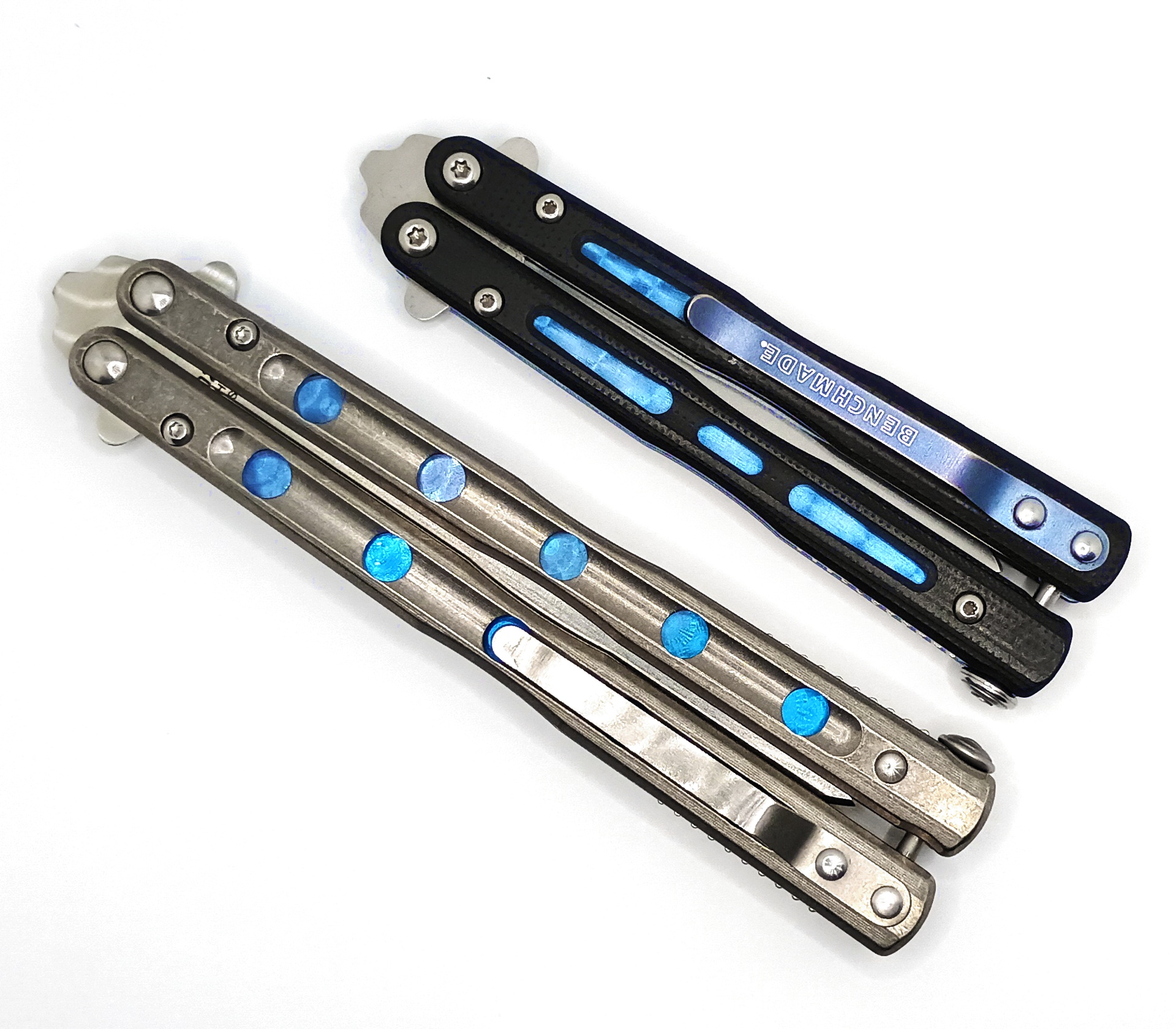
Incessant comparison with the Benchmade Model 32 and 51 are inevitable, considering that this is aiming to be a cheaper version of the same knife. It’s significantly longer than the Model 32, although that doesn’t tell us anything because so is the 51. That’s the entire point.
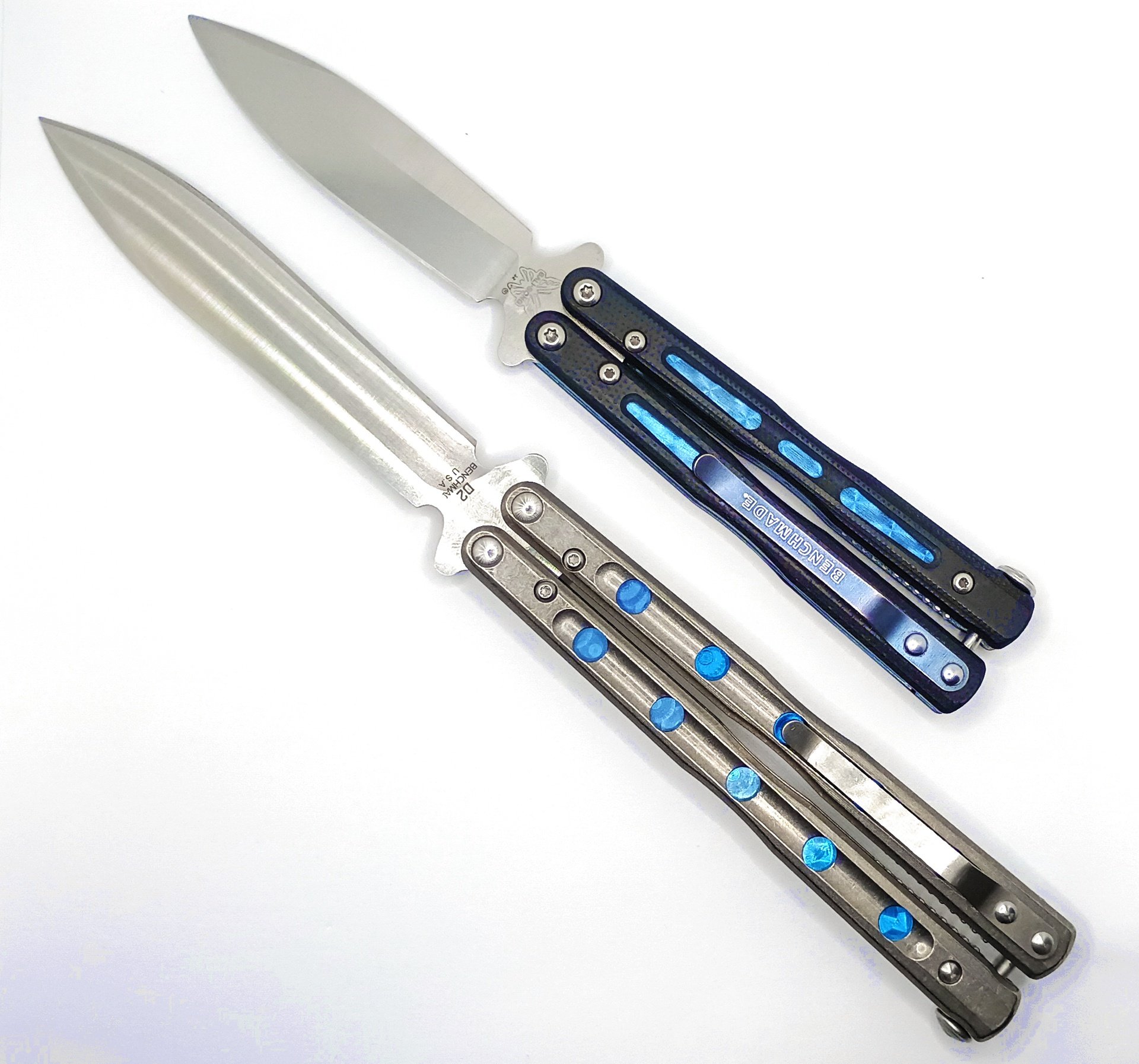
This as well as its original are “traditional” full sized knives, whereas the Model 32 is compact and unusually short for this category. Mine is up top in those photos.
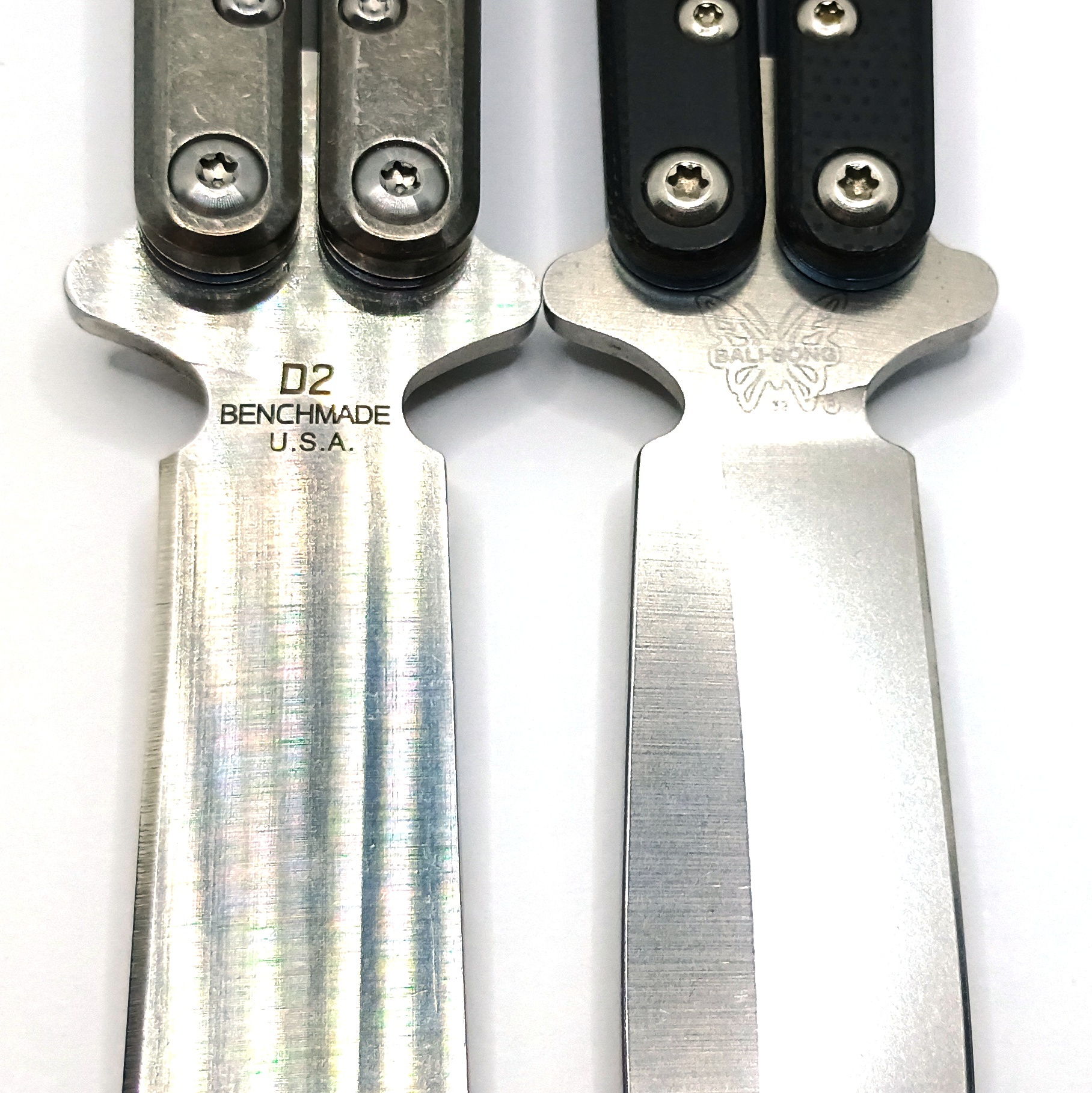
For the money, the Benchmade’s finish work is obviously superior. The blade polishes on these two knives aren’t even on the same planet as each other. The clone is a fine knife, but the Benchmade is visibly finer. That, and the Benchmade will actually come with a warranty. And it was made in America, if that matters to you.
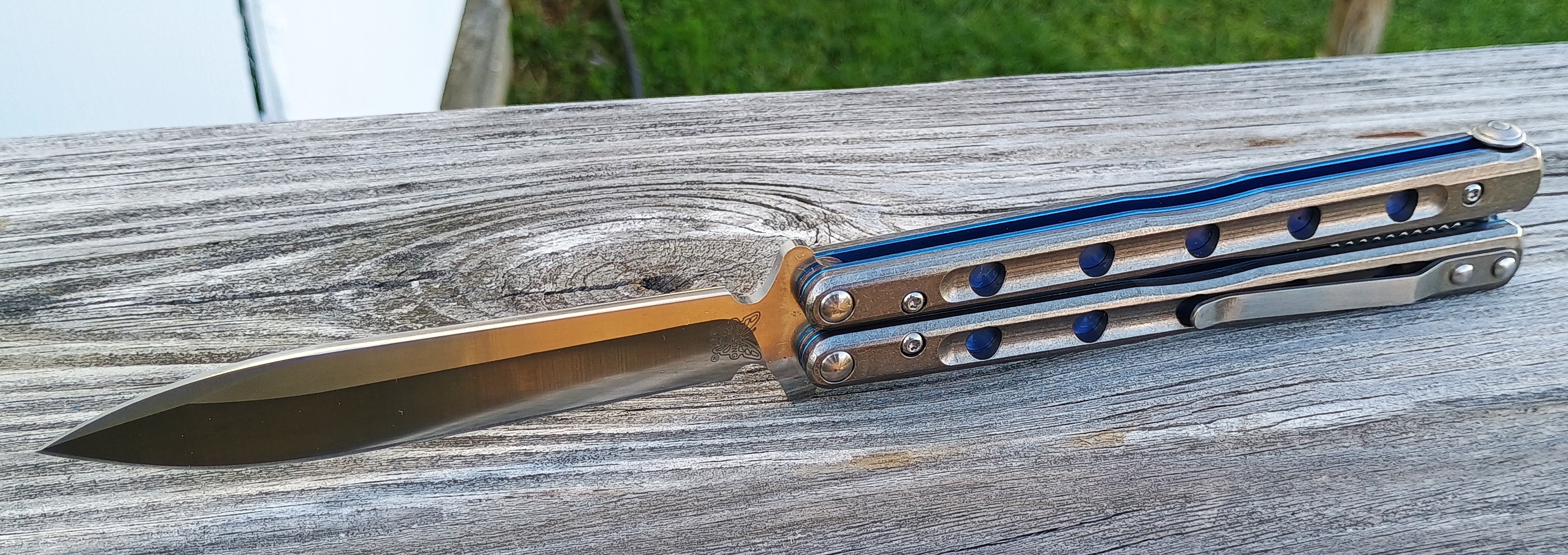
In operation, though, there is no other word for this TheOne incarnation other than fantastic. Everything you want a balisong to do in terms of spin, balance, and rebound it does perfectly. It does have a noticeably increased heft in the hand owing to the titanium rather than carbon fiber scales. Its spins are slower than the Benchmade’s, more deliberate and ponderous. It is still lighter than quite a few other brand name knives of similar length, though. It’s like half the weight of a Kershaw Lucha or Moonsault, for instance. And to be fair, the lickety-splitness of the Benchmade Morpho duo is down to both of them actually being much lighter than is typical for a balisong. They’re not benchmarks; they’re outliers.
Ironically, this is noticeably quieter on rebound than my Benchmade. The extra mass in those titanium scales probably has everything to do with that, absorbing the vibrations rather than broadcasting them. Neither knife is exactly loud, but the BM51 is even less so.
The Inevitable Conclusion
TheOne knocked this one out of the park, if you ask me. I always wanted a Model 51 and I’ve yet to find one A) readily for sale, and B) at a price I’m willing to pay just, ultimately, for the hell of it. So this scratches the same itch while falling within a much more attainable price bracket, and also carrying no collector’s value whatsoever so you won’t feel too bad actually using it for stuff. It’s a very visually striking knife, too. The bare titanium scales give it a certain gravitas, a sense that it is the real deal even though in one critical way it very much isn’t.
The fit, finish, and materials on offer here are all damn good – exemplary, even – and it raises the question of why in the hell the Chinese can pull of something like this so well but so few of the bespoke designs they come up with are ever worth a damn.
No, I’m not going to turn this into another globalization rant. We could be here for hours discussing why innovation is so unrewarded in China whereas copying off others is so lucrative. But that’s the gist of it, really. Make of it what you will.
But I like the TheOne BM51. Well, except for the fake logo on it. And the name, which makes it sound like you have a stutter.

